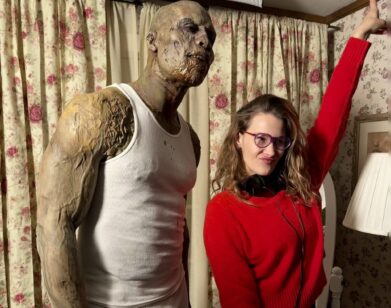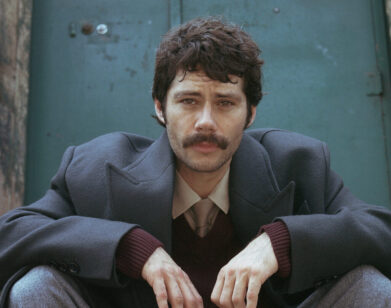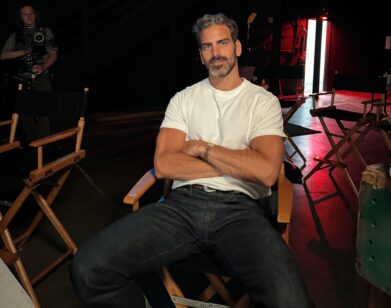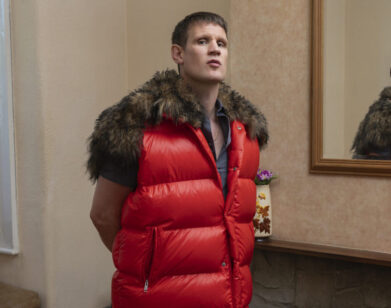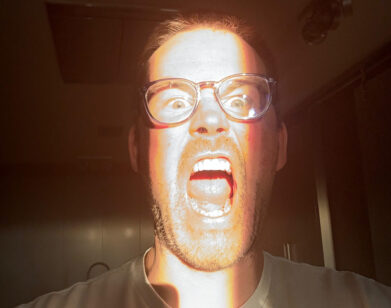David Wain, Community Builder
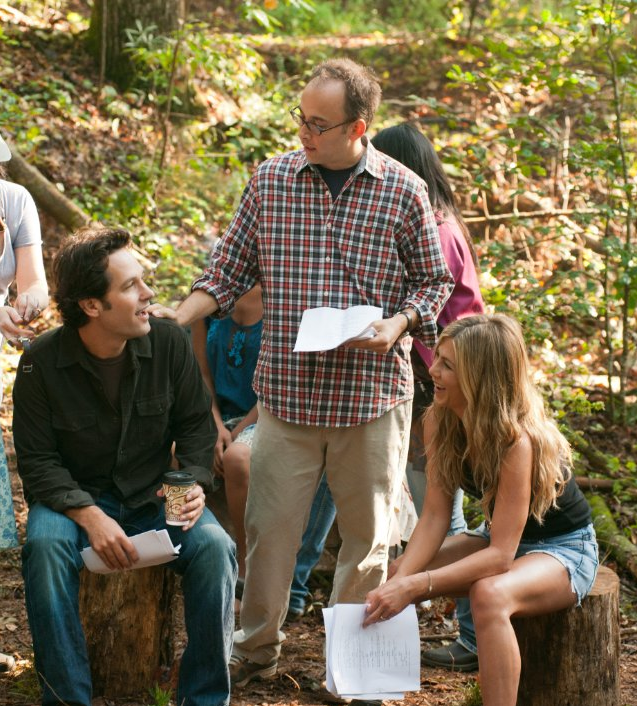
ABOVE: DAVID WAIN (CENTER) FILMING WANDERLUST WITH PAUL RUDD AND JENNIFER ANISTON. PHOTO COURTESY OF UNIVERSAL STUDIOS
Wanderlust begins with a simple, relatable premise: Linda (Jennifer Aniston) and George (Paul Rudd) live in a glorified closet in downtown Manhattan they can barely afford. When George loses his job, they begrudgingly pack up and make their way South to live with George’s brother, who offers him a demoralizing data-entry position. On their way down, they literally crash into a commune, where they stay the night and decide to, possibly, escape the big-city blues and spend the rest of their lives as free-loving hippies. Naturally, the plan goes haywire and their lives spin hilariously out of control.
Interview spoke to Wain about working too much, the benefits of balancing smaller projects with bigger films, and his beef with the legendary (and deceased) Ingmar Bergman. Wain had been the emergency room the night before, so the conversation begins with a quick comment on his health.
CRAIG HUBERT: Are you feeling better this morning?
DAVID WAIN: I’m up to 85, I think.
HUBERT: I’ll take it easy on you, none of the tough questions.
WAIN: Don’t slug me.
HUBERT: No problem. You have a ton of stuff happening, it seems, at one time. Wanderlust, Children’s Hospital, the Wainy Days webs shorts—how do you fit in a normal life? Do you ever sleep?
WAIN: It’s incredibly challenging lately. It’s definitely at the top of my list of problems these days. I’m working so much—I also have two small children—and I’ve become a ninja with computer-aided time-management techniques. I try my hardest to focus on the thing I’m doing in front of me fully and not think about the ten other things.
HUBERT: You wrote Wanderlust with Ken Marino. What is the process for you two like? Does it take a long time?
WAIN: The two scripts we initiated, each time we locked ourselves in a room for a week, working at least 12 hours a day, and go from not having an idea to having a first draft in that time. We would force ourselves. It’s a fun, concentrated way to do it and works well with our busy lives. The benefit of it is when you have a draft that you’re working from, it’s a thing, and it’s so much easier to look at it and say, “This needs to be changed, let’s fix that.” It still may take years to get the script in shape, but at least you have that initial draft.
HUBERT: Is that concentrated method of writing comfortable for you coming from a world of writing sketches with The State?
WAIN: Definitely, we learned something about writing under the gun in those years. Obviously, writing a sketch under the gun can take twenty minutes, not even a week. [laughs]
HUBERT: Do you cast as you write?
WAIN: Contrary to what you might think, more often than not, no. We’re just writing the characters. Partly because I think if we write too much too our friends, it might actually infuse the characters the wrong way. If you write something with someone in mind and they can’t do it, then you have to rethink what you’re thinking. Just in terms of the creating of these characters, pretty much, we write them in a vacuum. Then we go to all of our obvious ideas, which start with the guys from The State and then our larger group of friends who we love to work with. Without question, though, in Wanderlust, similarly to Wet Hot American Summer, we knew we were deliberately creating a world we knew would have places for a lot of our friends in it.
HUBERT: Do you ever have trouble explaining the style of comedy, or jokes, to actors who may not be familiar with your work?
WAIN: Well, there’s definitely a shorthand when you’ve been working with the same people for 25 years. I’m always amazed and pleased when we pick great people to join the party and how quickly they pick up on the rhythms and ideas and sensibilities and jump right in. I also realize that a lot of what I think of as the shorthand between me and the people I’ve worked with forever is not so different from the shorthand between any people who are good at comedic acting or writing.
HUBERT: I’m glad you mentioned getting people to “join the party,” because there was something about Wanderlust that reminded me of Wet Hot, even The Ten in a certain way. They all seem community-oriented, and a lot of the comedy is based on the interaction of a large group of characters. Is that part of the fun of making movies for you—getting a group of great people together and having fun?
WAIN: I would propose Role Models also on that list. The idea of a community of friends and also the idea of a commune-esque way of living your life, which is overtly discussed in Wanderlust, is definitely a theme that is interesting to me. I think it stems from working with The State, which was this 11-headed, democratic machine that really ran our lives from when we were 18 years old till our late 20s—the pleasures and pains of being one in the group. I’m always interested in, and attracted to, groups of friends and how they band together to distinguish themselves.
HUBERT: Wainy Days, your ongoing web series, has been a big success and was just released on DVD. Is it important for you to continue to work on the smaller projects in between the larger films?
WAIN: It is important to me. It’s like being a musician, and sometimes you just have to pick your acoustic and sing and play something without all the machines behind you. That’s the way I think of Wainy Days. It’s a much smaller, easier machine—and the machine absolutely affects the material and comedy. We did that kind of the thing when we were doing the Stella shorts years ago. When you’re just running around with a camera and goofing off, but it happens to be with a bunch of people who have a lot of experience and skills, you can come up with something that is its own animal. For me, doing Wainy Days is an essential part of keeping me sane. I can follow my own whim and let it end up on screen. Whether it’s 100 or a million people who watch it is secondary.
HUBERT: In the films you’ve directed, you never give yourself a big role. Do you ever think of writing something specifically for you to star in? When can we expect the big David Wain breakout performance? Or is that something you’re not interested in doing?
WAIN: I’m interested. In the movies I’ve done it’s been a combination of the feeling of writing, directing, and producing is enough work to do. I did it on the Stella show, on Comedy Central, where you’re directing and also you’re acting in a lot of it. Also, there hasn’t been this perfect role that I should play. I wrote an episode of Children’s Hospital this year that I’m one of the main characters in, but yes, that’s definitely on my list of things to do—one day make a movie where I play a more central role on screen.
HUBERT: I saw you’re part of the Film Comment Selects lineup this year. Congratulations. You’re screening on the same day as Ingmar Bergman, which must be thrilling. Are you calling people from film school and throwing it in their faces?
WAIN: Well, you know, Bergman—that motherfucker and I go way back. It’s been an ongoing rivalry, elevated by the press, always saying, “What’s going on with Waino and Ingmar Bergman?”
HUBERT: Think about it: there will be people at Lincoln Center, standing at the box office, deciding if they should see a Bergman film or Wanderlust.
WAIN: I know! If they want to go more avant-garde, they can jump back and forth between the two.
WANDERLUST IS OUT IN THEATERS FRIDAY.

